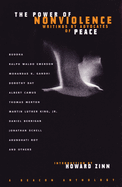 The fifteenth chapter of The Power of Nonviolence: Writings by Advocates of Peace contains Rajendra Prasad‘s 1963 essay The Way to Disarmament. Like the recently discussed writings by Merton, Fromm, and Muste, finding the path to peace through disarmament is the focus of Prasad’s essay. Dr. Prasad spent his life working for Indian independence and was the first President of the Republic of India. He wrote the essay a year before he died.
The fifteenth chapter of The Power of Nonviolence: Writings by Advocates of Peace contains Rajendra Prasad‘s 1963 essay The Way to Disarmament. Like the recently discussed writings by Merton, Fromm, and Muste, finding the path to peace through disarmament is the focus of Prasad’s essay. Dr. Prasad spent his life working for Indian independence and was the first President of the Republic of India. He wrote the essay a year before he died.
Prasad decries the technological advance of warfare. He found that this “misuse” of science and techonolgy vastly increased the scale of human life that was destroyed, and seperated the destructive act from the realization that human life was being taken. His discussion is immediately relevant to the use of drones to murder today. Prasad looks to his contemporaries for guidance on how to move foraward”
This is what Mahatma Gandhi meant when he said that ultimate nonviolence was only safe defense not only for the individual but for nations.
Prasad did not expect all of humanity to adopt Gandhi’s nonviolent principles, as he had done.
Our objective is a limited one — namely, the cessation of all nuclear tests, banning of nuclear weapons and total disarmament.

Because of the scale of the effect of the weapons of amss destruction, Prasad finds that it is no longer just a dispute between two isolated parties, current and future generations on a planet-wide scale are at risk. There is no defense against nuclear war, only rettaliation, which would spread the planet-wide effects.
Like Merton and Fromm, he finds that continuing to depend on increasing amounts of nuclear weapons while hoping for peace, is insane. Prasad, too, finds that only only solution is to step into a new paradigm.
The cure for fear, Mahatma Gandhi taught us, is faith, for suspicion sincerity, and for distrust, trust.
Prasad dissects the problem with piecemeal movement toward disarmament. Often one parties proposal to institute a freeze against new weapons, testing, or a certain type of weapon is just way to lock in place the advantage one side has over the other.
The straightest and simplest way to break through this viscous cycle would be for all powers to abjure the use of force altogether, and for this abjuration would have to be reflected in their domestic policies.
Prasad calls on the countries of the world for one to be the first to unilaterally disarm. He specially calls out his own India as a country that should lead the way based on its creation through nonviolence. Prasad turns again to Gandhi to emphasize that India’s history does not mean it will reach disarmament first nor does it excuse the other nations from the possibility of leapfrogging forward to disarmament.
Though Prasad is not under any illusion that disarmament will happen in a single step, he emphasizes that the only path is “unadulterated nonviolence” He sees no room for “compromise” on that principle, palliatives or expediency. There is no lesser evil when it comes to violence nor the excuse that the “perfect is the enemy of the good.”
A plan for nonviolent defense, however, can have as its object only the preservation of of a way of life that is based on honest industry, and the right to enjoy in full the fruit of such industry, coupled with equality and individual freedom, not a way of life based on exploitation, inequality, class distinction, class pride and class rule.
Prasad contrasts the inability of nuclear weapons to preserve any “way of life” except its “extinction” with the numerous successes of nonviolent movements in the 20th century. He argues that the only way to fight the “terrorism” of nuclear weapons is to refuse to submit to them. Prasad gives India’s own history as the example. the British knew they could continue with their violence, but they could no longer count on it generating submission.
Prasad returns to Gandhi’s own statements on nuclear weapons. He found that nonviolence was the only response, and hope of avoiding humanity’s “suicide”.
Related articles
- Merton: The Root of War is Fear (peacecouple.com)
- Fromm: Unilateral Nuclear Disarmament (peacecouple.com)
- Nonviolence: Muste’s Getting Rid of War (peacecouple.com)


